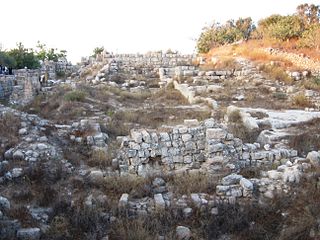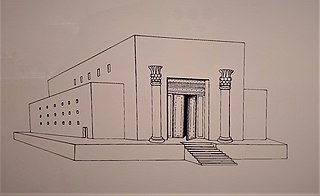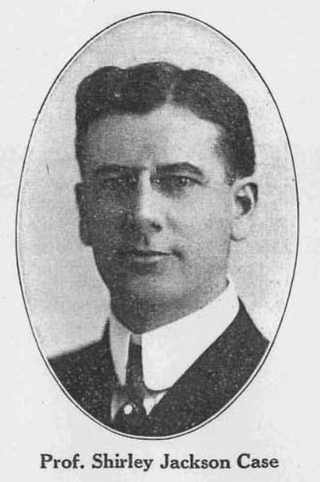
The Kingdom of Judah was an Israelite kingdom of the Southern Levant during the Iron Age. Centered in Judea, the kingdom's capital was Jerusalem. The other Israelite polity, the Kingdom of Israel, lay to the north. Jews are named after Judah and are primarily descended from it.

The Kingdom of Israel, or the Kingdom of Samaria, was an Israelite kingdom in the Southern Levant during the Iron Age. The kingdom controlled the areas of Samaria, Galilee and parts of Transjordan. Its capital, for the most part, was Samaria. A separate Israelite polity, named the Kingdom of Judah, with its capital in Jerusalem, existed to its south.

Yahweh was an ancient Levantine deity that emerged as a "divine warrior" associated first with Seir, Edom, Paran and Teman, and later with Canaan, as the national god of ancient Israelites and Judahites. The origins of his worship reach at least to the early Iron Age, and likely to the Late Bronze Age if not somewhat earlier.
Sceva was a Jew called a "chief priest" in Acts 19:14, although whether he was a chief priest is disputed by some writers. Although there was no high priest in Jerusalem by this name, some scholars note that it was not uncommon for some members of the Zadokite clan to take on an unofficial high-priestly role, which may explain this moniker. However, it is more likely that he was an itinerant exorcist based on the use of the Greek term "going from place to place" used in Acts 19:13 in relation to his so-called "sons".

Naboth was a citizen of Jezreel. According to the Book of Kings in the Hebrew Bible, he was executed by Queen Jezebel so that her husband Ahab could possess his vineyard.

In the biblical Book of Genesis, Cain and Abel are the first two sons of Adam and Eve. Cain, the firstborn, was a farmer, and his brother Abel was a shepherd. The brothers made sacrifices to God, but God favored Abel's sacrifice instead of Cain's. Cain then murdered Abel, whereupon God punished Cain by condemning him to a life of wandering. Cain then dwelt in the land of Nod, where he built a city and fathered the line of descendants beginning with Enoch.

William Foxwell Albright was an American archaeologist, biblical scholar, philologist, and expert on ceramics. He is considered "one of the twentieth century's most influential American biblical scholars."
Womanist theology is a methodological approach to theology which centers the experience and perspectives of Black women, particularly African-American women. The first generation of womanist theologians and ethicists began writing in the mid to late 1980s, and the field has since expanded significantly. The term has its roots in Alice Walker's writings on womanism. "Womanist theology" was first used in an article in 1987 by Delores S. Williams. Within Christian theological discourse, Womanist theology emerged as a corrective to early feminist theology written by white feminists that did not address the impact of race on women's lives, or take into account the realities faced by Black women within the United States. Similarly, womanist theologians highlighted the ways in which Black theology, written predominantly by male theologians, failed to consider the perspectives and insights of Black women. Scholars who espouse womanist theology are not monolithic nor do they adopt each aspect of Walker's definition. Yet, these scholars often find kinship in their anti-sexist, antiracist and anti-classist commitments to feminist and liberation theologies.

Sex is considered repeatedly in the Hebrew Bible. Some references provide unambiguous ethical regulations, such as the laws given in Leviticus or Deuteronomy. Others are more ambivalent, most famously the potentially homosexual actions of Ham with his father, Noah. Its depictions of homosexuality, rape, prostitution and incest have spurred considerable academic and theological attention.
The Society of Biblical Literature (SBL), founded in 1880 as the Society of Biblical Literature and Exegesis, is an American-based learned society dedicated to the academic study of the Bible and related ancient literature. Its current stated mission is to "foster biblical scholarship". Membership is open to the public and consists of over 8,300 individuals from over 100 countries. As a scholarly organization, SBL has been a constituent society of the American Council of Learned Societies since 1929.

Ephraim Avigdor Speiser was a Polish-born American Assyriologist. He discovered the ancient site of Tepe Gawra in 1927 and supervised its excavation between 1931 and 1938.
Trinity Southwest University (TSU) is an unaccredited evangelical Christian institution of higher education with an office in Albuquerque, New Mexico. Principally a theological school that encompasses both the Bible college and theological seminary concepts of Christian education, it offers distance education programs and degrees in Biblical Studies, Theological Studies, Archaeology & Biblical History, Biblical Counseling, Biblical Representational Research, and University Studies.
Studium Biblicum Franciscanum is a Franciscan academic society based in Jerusalem. It is a center of biblical and archaeological research and studies.
The Biblical Archaeology Society was established in 1974 by American lawyer Hershel Shanks, as a non-sectarian organisation that supports and promotes biblical archaeology. Its current publications include the Biblical Archaeology Review, whilst previously circulating the Bible Review (1985–2005) and Archaeology Odyssey (1998–2006). The Biblical Archaeology Society also publishes books about biblical archaeology aimed at a general readership. The Society has, for more than 30 years, run seminars and tours offering an opportunity to learn directly from world-renowned archaeologists and scholars. It also produces videos (DVD) and CDs on archaeology and biblical archaeology.
Epic is a genre of narrative defined by heroic or legendary adventures presented in a long format. Originating in the form of epic poetry, the genre also now applies to epic theatre, epic films, music, novels, stage play, television series, and video games. Scholars argue that 'the epic' has long since become "disembedded" from its origins in oral poetry.

Samaria was a city in the historical region of Samaria that served as the capital of the northern Kingdom of Israel during the 9th and 8th centuries BCE. Towards the end of the 8th century BCE, possibly in 722 BCE, Samaria was captured by the Neo-Assyrian Empire and became an administrative center under Assyrian, Babylonian, and Persian rule. During the early Roman period, the city was expanded and fortified by Herod the Great, who renamed it “Sebastia” in honor of emperor Augustus.

Solomon's Temple, also known as the First Temple, is a Temple in Jerusalem believed to have existed between the 10th and 6th centuries BCE. Its presumed existence is largely based on narratives in the Hebrew Bible, in which it was commissioned by biblical King Solomon before being destroyed during the siege of Jerusalem by King Nebuchadnezzar II of the Neo-Babylonian Empire in 587 BCE. Although most modern scholars agree that the First Temple existed on the Temple Mount in Jerusalem by the time of the Babylonian siege, there is significant debate over the date of its construction and the identity of its builder.

Asian Theological Seminary (ATS) is a theological seminary in Quezon City, Philippines.

Shirley Jackson Case (1872–1947) was an historian of early Christianity, and a liberal theologian. He served as dean of the Divinity School at the University of Chicago.
Jennifer Speake, néeDrake-Brockman is a Canadian-British freelance writer and editor of reference books.











